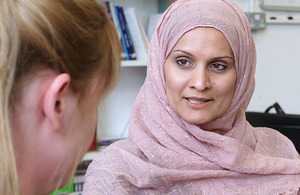New framework to support trainee and early career teachers
The Department for Education has today (30 January) announced a new framework which will help ensure high quality teaching and improve pupil outcomes.

The Department for Education has today (30 January) announced a new framework which will help ensure high quality teaching and improve pupil outcomes.
The new initial teacher training and early career framework (ITTECF) combines and updates the initial teacher training core content framework (CCF) and the early career framework (ECF). It will ensure that all new teachers receive three or more years of training underpinned by the best available evidence.
The frameworks were designed to help trainee and early career teachers succeed at the start of their teaching careers and combining them will mean teachers will get a more joined up development journey beyond initial training into the early years of their career.
Schools Minister Damian Hinds said:
Great teaching is key to securing academic success and improving pupil outcomes, which is why it is so important we continue to support teachers with high-quality, evidence-based training.
Today, we have announced a new combined framework to provide trainee and early career teachers with the knowledge and skills they need in those crucial first years in the classroom.
It’s thanks to the hard work of teachers and leaders that education standards have risen significantly since 2010. That is why we will continue to invest in competitive pay and high-quality training, improving teacher wellbeing and easing workload pressures.
Working with experts across the education sector, the framework has been updated to ensure it’s based on the latest evidence, including new and updated content on how teachers should support pupils with special educational needs and disabilities (SEND), high quality oral language, and early cognitive development and children’s mental health.
Later this year, the Department for Education will be procuring updated training programmes for early career teachers (ECTs) based on this new framework. They will be designed after an evaluation of the national ECF reforms since September 2021.
The updated programmes, to be rolled out from September 2025, will be better designed to take ECTs’ learning from initial teacher training into account, provide more tailoring based on their level of development, subject and context, and streamline the training and support for mentors so they can better focus on supporting their ECTs.
The framework is a central part of the government’s teacher recruitment and retention strategy and is supported by the £130 million invested annually into the ECF.
The reforms to support trainees and ECTs builds on the government’s action to boost teacher recruitment, with £196 million invested this academic year to fund scholarships, bursaries and salary grants to help thousands of candidates through their initial teacher training.
Margaret Mulholland, ASCL SEN & Inclusion Policy Specialist said:
We must equip new teachers with the confidence and competence to know they can support every child. Whilst there are no ‘quick fixes’ for teachers or children, an Initial Teacher Training and Early Career Framework that gives more specific focus to developing the knowledge and skills to support pupils that need the most help is welcomed.
Professor Becky Francis, CEO of the Education Endowment Foundation (EEF), said:
Like all great professions, teaching deserves to be built upon a core body of knowledge and skills that describe best practice and are drawn from robust research. By setting out what trainee and early career teachers should be entitled to know and do, today’s updated framework is an important step to realising this.
By independently assessing and endorsing the framework, we’ve made sure the claims it makes accurately reflect the evidence from which they were drawn. Our hope is that providers will be able to translate the framework into practically relevant programmes, balancing the need to cover core content alongside the holistic needs of their participants.
Last year, the government delivered on the manifesto commitment to give every new teacher a starting salary of at least £30,000 – alongside the highest pay award for teachers in over 30 years.
In strengthening the focus on helping teachers to support children and young people with SEND, we are building on wider government reform through the SEND and AP improvement plan, which outlines plans to reform the system, ensuring every child has access to a high-quality, fulfilling education.
The SEND system is underpinned by increased investment in the high needs budget, which will have risen by over 60 percent since 2019 to 2020 to over £10.5 billion in 2024 to 2025.
Supporting teachers’ development will continue to improve pupils’ outcomes. With thanks to the hard work of teachers already, standards of education have risen sharply since 2010, with 89 percent of school rated good or outstanding by Ofsted, up from just 68 percent in 2010.
Also, pupils in England have risen up the international rankings for maths, placing England as one of the top performing countries in the western world.
This built on existing international success, with England coming fourth for primary reading proficiency, out of 43 countries that tested children of the same age in the Progress in International Reading Literacy Study.
DfE media enquiries
Central newsdesk - for journalists 020 7783 8300